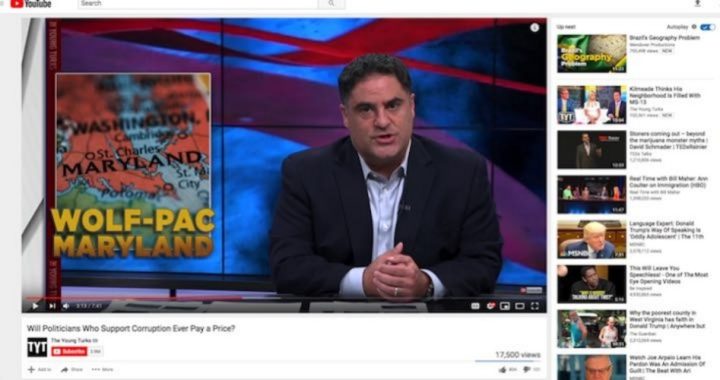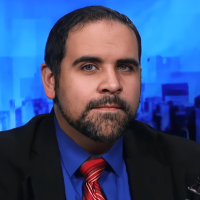
Wolf-PAC — a left-wing organization advocating for a constitutional convention (Con-Con) to propose a constitutional amendment to abolish super PACS like itself and to “get money out of politics” — is now calling on supporters to send them money to back politicians running against incumbent legislators who oppose a Con-Con.
In an e-mail sent to supporters on Thursday, Wolf-PAC founder and YouTube personality/host of The Young Turks (TYT) show Cenk Uygur told about a “critical operation Wolf-PAC is doing in Maryland right now.” The e-mail included a link to a TYT YouTube video of Uygur lamenting the defeat of Wolf-PAC’s Con-Con resolution in Maryland earlier this year (House Joint Resolution 11) and his new “stick” approach, which is to challenge and oppose the reelection of incumbent state legislators who oppose a Con-Con by financially contributing to their opponents.
Similarly, leaders for the Convention of States (COS) Project, and their COS water boy radio talk-show host and Fox News personality Mark Levin, have threatened to do the same to constitutionalist Republican legislators who’ve oppose or blocked the passage of COS Article V convention resolutions.
So far, as of June 22, 2018, neither COS nor Wolf-PAC has successfully passed a single Article V convention resolution this year. Despite having their particular Con-Con resolutions introduced in many state legislatures this year, they have been defeated or stopped in state after state by both Republicans and Democrats who recognize the dangers of a convention, potentially opening the entire Constitution for revision.
What COS has threatened to do, now Wolf-PAC is doing. What is an ironic about-face is that unlike COS, which does not advocate for a constitutional amendment to get money out of politics, Wolf-PAC does support such an amendment to the Constitution. In fact, getting money out of politics is the single most important reason why Cenk Uygur created Wolf-PAC in the first place, with the help of liberal Harvard Law School Professor and advocate for a “bipartisan” Con-Con Lawrence Lessig.
In the TYT video, Uygur focuses on the campaign of Antonio Hayes. A Democrat, Hayes is a member of the Maryland House of Delegates — the lower chamber of the Maryland General Assembly or legislature and is the equivalent to a House of Representatives, as other states and Congress call their lower legislative chamber.
Hayes was also one of the sponsors who voted for HJR 11 — Wolf-PAC’s Con-Con resolution — earlier this year that passed in his chamber. Now Hayes is running for the state senate in a primary to unseat incumbent Democratic State Senator Barbara Robinson, who blocked the passage of HJR 11 in the Senate.
Uygur explained that there are “carrots and sticks in politics,” and that “it is now time for the sticks,” in order to chastise those who oppose his efforts to alter the Constitution through a convention.
So if state legislators, be they a Republican or Democrat, want to oppose Wolf-PAC’s Con-Con resolutions, watch out: Cenk Uygur’s Wolf-PAC will now go after you.
Wolf-PAC is fighting to reshape the Democratic Party to embrace an Article V amendments convention in order to make the Constitution more progressive. In fact, the name given to their proposed amendment in the text of HJR 11 is the “Democracy Amendment.”
So in addition to the reason of “getting money out of politics,” Wolf-PAC’s proposed amendment to the Constitution seeks to insert the word “democracy” in reference to our form of government, when in fact it is a republic, sometimes referred to as a “democratic republic,” but a republic nevertheless. Nowhere in the Constitution or in any of its amendments is found the word “democracy.”
Instead, Article IV, Section 4 of the Constitution, specifically states: “The United States shall guarantee to every State in this Union a Republican form of Government , and shall protect each of them against Invasion; and on Application of the Legislature, or of the Executive (when the Legislature cannot be convened), against domestic Violence.” (Emphases added.)
Furthermore, the Constitution outlines how the branches of the federal government operate as a republic. It was not until the ratification of the 17th Amendment in 1917, which provided for the direct election of U.S. senators by popular vote in each state, that people could democratically vote for their state’s own U.S. senators. Before the 17th Amendment, under Article I, Section 3 of the Constitution each state’s U.S. senator was “chosen by the Legislature thereof,” meaning that the U.S. senators acted much like ambassadors to the federal government representing the interest of their home state’s government.
This was an essential check on the federal government by the states that sadly no longer exists in the Constitution. In fact, a repeal of the 17th Amendment would be an ideal candidate for a new constitutional amendment proposed by Congress (rather than by an unpredictable, and potentially lethal Article V convention would be to our Constitution and republic), in order to restore the original republic and reassert the constitutional sovereignty of the states.
A new constitutional amendment, regardless of its stated purpose, with the word “democracy” sneaked in the text, would have even more far-reaching consequences to our Constitution in decades and centuries to come. The courts and elected officials would more than likely interpret the new “democracy clause” to justify an array of radical changes and provisions, such as the abolition of the often-called “undemocratic” Electoral College to the potential constitutionalizing of presently unconstitutional welfare and socialized medicine legislations that are approved by popular majority-vote.
As we edge closer to the upcoming congressional mid-term and state legislative elections this September, as well the primaries even sooner, it would behoove constitutionalists not to let their efforts diminish in fighting such efforts as those of Wolf-PAC and others to challenge anti-Con Con legislators, and also to recognize where candidates stand on this all too important issue.
It could affect the passage or defeat of Con-Con resolutions in the 2019-2020 state legislative sessions.





